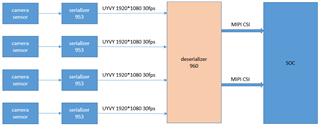Part Number: DS90UB960-Q1
Hello, Ti engineers,
We are using Ti ds90ub960 chip to collect 4-channel camera image data, as shown in the figure below:

As a module, sensor + 953 can normally output uyvy 1920 * 1080 30fps image data,
How to configure 960 registers to capture images? I hope Ti can provide a 960 sample code.

